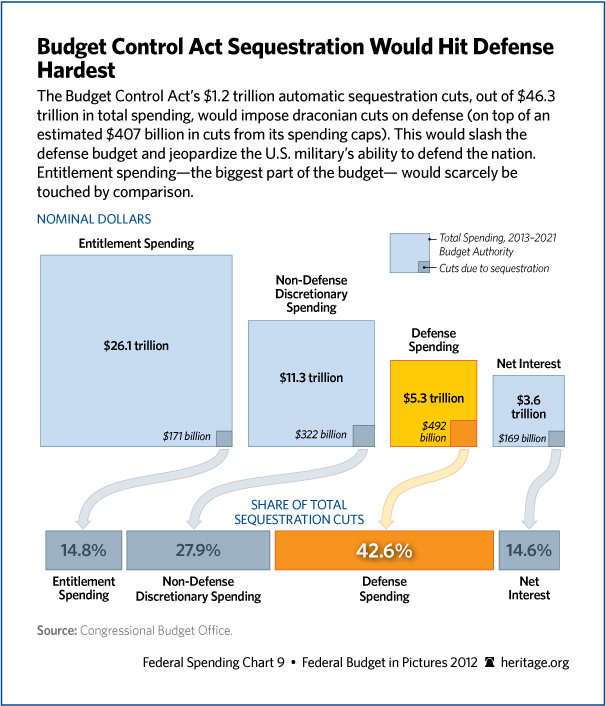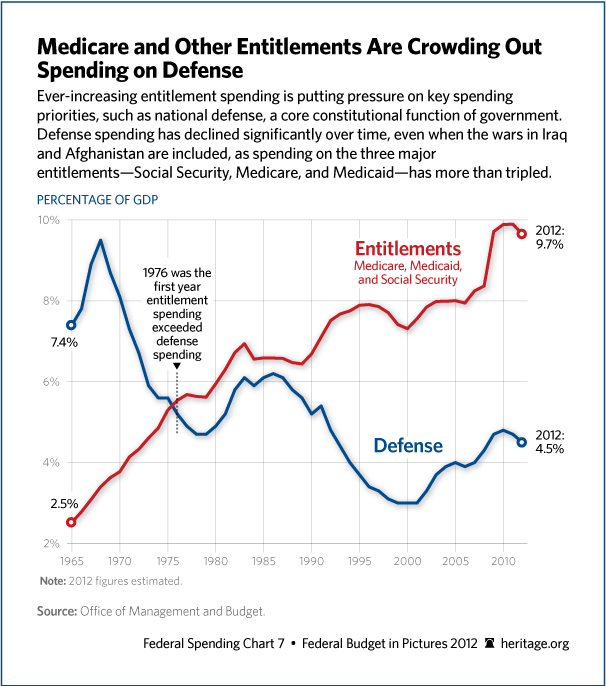Peace through strength gutted? What the fiscal cliff means: Part 2
Dec 28, 2012
In Part 1 of our examination of the looming “Fiscal Cliff,” we noted that a failure to resolve a major policy impasse in Washington would leave Ohioans facing higher taxes and job losses as a result. In Part 2, we will address the negative implications for Ohio’s and the nation’s defense should politicians in Washington drive us over the “Cliff.”
Defense is a primary, necessary, and constitutionally ordained function of the national government. An inability to defend one’s country makes other concerns and functions of government moot. The Founding Fathers understood this, and thus constitutionally vested the national government with the authority and indeed the duty to defend the nation.
Unfortunately, if the U.S. goes over the “Fiscal Cliff,” a round of indiscriminate cuts, known as “sequestration” will be made to the Federal Budget. The cuts will impact many areas of spending, ranging from 7 to 10 percent of what is called “discretionary spending.” National defense is largely considered “discretionary” and is the main target of sequestration.
But the meat cleaver of sequestration falls disproportionately on Defense.
As the Heritage Foundation indicates: of the $1.1 trillion in Federal Budget cuts scheduled to begin in January and commence over the next decade, $492 billion, or nearly 43 percent, is obtained through Defense cuts. Meanwhile, only 14.8 percent, or $171 billion, will be cut from “Entitlement” spending which comprises Social Security, Medicare and Medicaid.

While almost everyone can agree that the Federal Government needs to dramatically curb its spending appetite, the problem with the sequester is that the lion’s share of the debt burden the U.S. is currently accruing comes from Entitlement spending, not Defense. In fact, in 2012, Entitlement spending accounted for 10 percent of U.S. GDP, while Defense accounted for only 4.5 percent.
In a way, sequestration is like cutting off a patient’s leg in order to deal with an infected toe. It is entirely indiscriminate, fails to focus on the driver of the national debt, and runs the significant risk that the U.S. may find itself unprepared to adequately address a global security environment that is highly unstable.

For those that think the world is a relatively benign place and that we can reduce our military readiness without repercussion, consider that the global challenges the U.S. is facing:
- an aggressive nuclear weapon’s development program continued by a radical Islamist government, which has previously taken to calling the U.S. the “Great Satan” (Iran);
- recurrent nuclear tests by a rogue state with a history of supporting terrorism (North Korea);
- an amorphous and dedicated group of terrorists willing to die in their cause including, if they can, through the use of weapons of mass destruction;
- the possible re-introduction of chemical weapons in conflict (Syria);
- the military rise of an authoritarian China that is already acquiring the ability to potentially deny the U.S. access to trading routes in East Asia, arguably the new economic center of the world.
Additionally, lest one think this is all about what happens “over there,” Ohio has faced global threats right here in our own backyard.
As Buckeye Institute President, Robert Alt, outlined in a recent post on National Review’s Corner blog:
…four of the 50 terrorist plots prevented since 9/11 have had a nexus with Ohio, including a foiled plot to bomb an Ohio shopping mall, a terrorist from Columbus convicted for providing material support to al-Qaeda to destroy the Brooklyn Bridge, three men convicted in Toledo for plotting to commit acts of terror against Americans overseas, and Christopher Paul, a Columbus citizen who was arrested for conspiracy to use a weapon of mass destruction against targets in Europe and the United States, and who agreed to a plea deal under which he is serving 20 years in prison.
While all of the above scenarios could play out in peaceful ways, prudence demands that the United States have the military capacity to address these challenges if foreign powers or terrorists act in ways that are contrary to our national security interests. This requires a robust U.S. military that is able to address such events as they emerge to threaten our security. While there may well be a need for surgical cuts to the U.S. Defense Budget, the hatchet being wielded as part of sequestration is a poor and dangerous tool that largely ignores the real drivers of our national debt.
President Reagan often said, “We must find peace through strength.” We should not forget that admonition today.
In Part 3 of our look at the “Fiscal Cliff” and its impact, we will look at how the indiscriminate cuts, particularly the Defense cuts, could adversely impact Ohio jobs.

